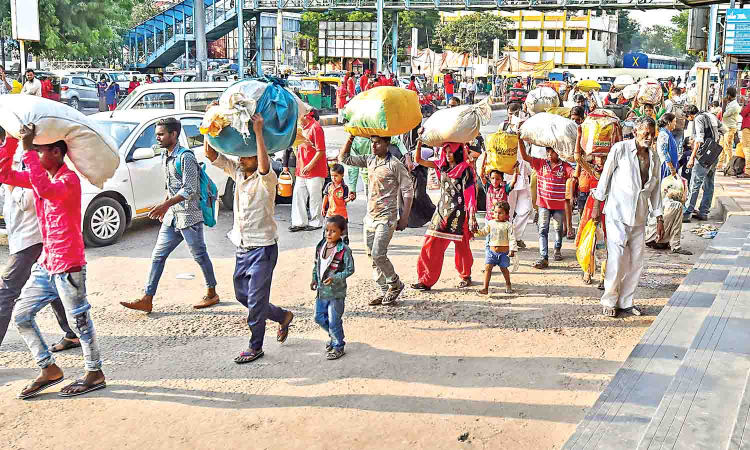Invisible voters: Migrant workers in TN fear being left out of Bihar SIR
The first phase of the SIR, which became the centre of a political storm during the monsoon session in Parliament, saw over 65 lakh voters excluded from the electoral roll

30L voters, tagged permanent migrants excluded from Bihar rolls
CHENNAI: Eking out a living hundreds of miles away from his native Bihar, Ranjith Kumar is feeling the heat of the Election Commission of India’s ongoing Special Intensive Revision (SIR) of the electoral roll. The 34-year-old garment worker, eking out a livelihood in Tamil Nadu’s Tiruppur district, welcomes the Commission’s initiative aimed at removing ineligible voters, but expresses concern that it may disadvantage hundreds of migrant labourers like himself.
The first phase of the SIR, which became the centre of a political storm during the monsoon session in Parliament, saw over 65 lakh voters excluded from the electoral roll. Of these, around 30 lakh were categorised as “permanent migrants”. Ranjith fears he may be among them. “I received a call from my family about SIR. If they ask me to return home to submit forms, I will go,” he said. He works in the same garment unit with 20 other young men from Samastipur and nearby districts in Bihar, and insists that authorities should allow sufficient time for them to complete the application process.
Not all migrants are as informed as Ranjith. Dabbalu, who migrated from Samastipur with his family in search of better prospects a few years ago, has found some stability in Alathur, Chengalpattu district. He works at a talcum manufacturing unit nearby. “We never missed voting. We went last year for the Lok Sabha polls,” said Dabbalu’s mother, Poolan Devi, who also works at the same unit to support the family. However, she admitted that the family and their neighbours from Bihar were unaware of the SIR exercise. They are the voice of thousands of workers from Bihar who work in construction, textile, and various other sectors in TN.
“Many migrant families, who live in clusters here, are clueless about SIR, even though they remain in touch with their relatives back home,” said labour activist TK Ezhumalai, who works with migrant communities on the outskirts of Chennai.
Experts have raised concerns that migrant workers face a high risk of being excluded and potentially losing their right to vote. They argue that the exercise lacks transparency, with little clarity on how migrants are classified – whether seasonal or permanent.
Citing the 2011 Census, in which migrant workers accounted for just over 7% (around 75 lakh) of Bihar’s total population, the experts have also pointed out that the number of workers excluded in the exercise would increase manifold.
“The ECI has no concrete data on migrants, who are at the mercy of Electoral Roll Officers and Assistant Electoral Roll Officers to remain on the voters’ list. Yet, it released figures suggesting around 30 lakh people had permanently migrated and were removed. These numbers are based on door-to-door verification by Booth-Level Officers,” said professor Pushpendra, former dean of the Tata Institute of Social Sciences, speaking to DT Next. He added that there have been several reports of BLOs conducting the verification poorly and filling out forms in bulk.
Meanwhile, most migrant workers remain unaware of the exercise or the 11 documents required to prove their citizenship. “Migrants will be affected in large numbers,” Pushpendra warned, citing a quick SWAN survey showing that 90% of migrant workers outside Bihar had not even heard of SIR, and fewer than 1% had submitted forms online.
Echoing the concern, Umi Daniel of Migration-Aide et Action questioned whether the authorities truly understand the definitions and types of migration. “Looking at the current situation, there is no clarity in the SIR process,” he said, adding that low-wage migrants, who return home only during festivals or harvest, neither have the resources nor the time to gather the required documentation.



